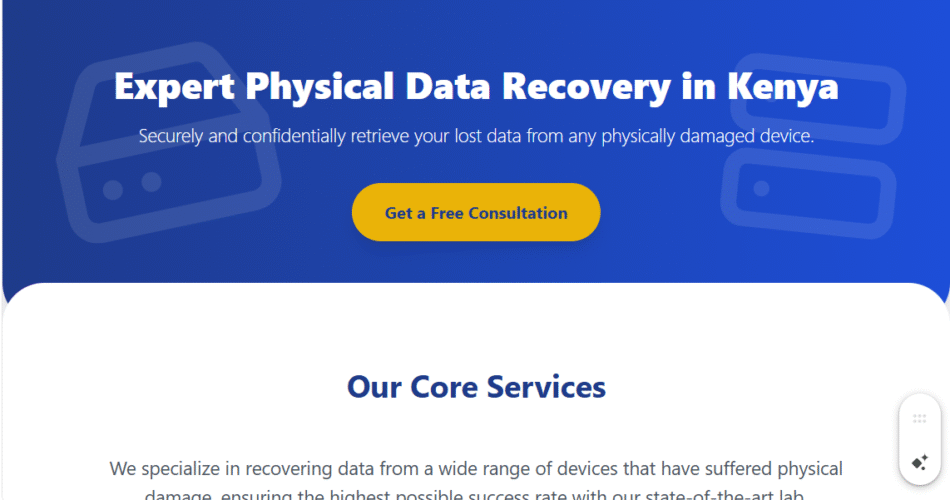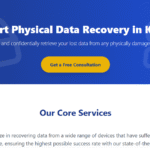Physical Data Recovery in Kenya:
- Delivery Time2 Weeks
- English levelProfessional
- LocationUSA, United Kingdom, United Arab Emirates, Nairobi, Kilimani, Kenya, Dubai, CBD Nairobi, Canada, Australia
Service Description
The cost of Physical Data Recovery in Kenya is 80000KES.Get Physical Data Recovery in Kenya at a price of 75000KES at Black Shepherd Technologies.
Professional physical data recovery services in Kenya for hard drives, SSDs, RAID arrays, and more. Our Class 100 cleanroom lab and expert technicians offer secure and successful data retrieval from crashed, damaged, or failed storage devices. Get a free diagnosis today.
Data loss can be a devastating experience for individuals and businesses alike, and when it’s caused by a physical failure of the storage device, the situation requires specialized expertise. In Kenya, the demand for reliable and professional physical data recovery services is growing as more of our lives and work become digitized. Unlike logical data recovery, which deals with software-based issues, physical data recovery addresses problems such as a crashed hard drive, a damaged solid-state drive (SSD), a corrupted RAID array, or a physically broken USB flash drive. This process involves a meticulous and often complex set of procedures performed in a controlled environment to salvage data from a non-functional device.
The most critical aspect of physical data recovery is the use of a Class 100 cleanroom. A cleanroom is a laboratory environment where the air quality, temperature, and humidity are strictly controlled to prevent dust particles from contaminating the delicate internal components of a hard drive. Even a single speck of dust can cause catastrophic damage to the platters and read/write heads of an open hard drive, making a cleanroom an indispensable tool for successful recovery. In Kenya, a reputable data recovery service provider will have such a facility, along with a team of trained and certified technicians who understand the intricate mechanics of various storage media.
The process typically begins with a thorough diagnosis of the failed device. This initial assessment helps to determine the extent of the damage, the likelihood of a successful recovery, and the estimated cost. Common physical failures include a head crash, where the read/write heads have made contact with the magnetic platters, leading to severe scratching and data loss; motor failure, which prevents the platters from spinning; and circuit board (PCB) failure, which can be caused by power surges or electrical shorts. For SSDs, common physical issues include controller chip failure or damaged NAND flash memory chips.
Once the diagnosis is complete, the technicians will move the device into the cleanroom for the actual recovery. For hard drives, this often involves replacing damaged components, such as the read/write heads or the spindle motor, with working parts from a donor drive of the exact same make and model. This process requires a high degree of precision and specialized tools. For RAID systems, the challenge is even greater, as it involves not only addressing the physical failure of one or more drives but also re-building the RAID configuration virtually to access the data. This requires sophisticated software and a deep understanding of RAID architecture.
Another area of expertise is the recovery of data from flash media, such as USB drives, SD cards, and SSDs. When these devices suffer a physical failure, the data is not on magnetic platters but within NAND flash memory chips. The recovery process involves “chip-off” techniques, where the memory chip is carefully desoldered from the circuit board and its data is read using a specialized reader. This raw data is then processed and re-assembled using complex algorithms to reconstruct the file system and user data. This method is particularly useful for devices that have been physically broken, bent, or water-damaged.
In Kenya, choosing a data recovery service provider requires careful consideration. It is essential to choose a company that is transparent about their processes, provides a no-obligation diagnostic, and operates with a “no data, no fee” policy. They should also prioritize data privacy and security, ensuring that client information is handled with the utmost confidentiality. Businesses and individuals should be wary of unqualified technicians who may attempt to open a hard drive in an uncontrolled environment, as this almost always leads to irreversible data loss. The investment in professional physical data recovery is not just about getting the data back; it’s about doing so safely and securely, without compromising the integrity of the information. By choosing a reputable and well-equipped service, Kenyans can have peace of mind knowing that their critical data has the best possible chance of being recovered.
In conclusion, the need for professional physical data recovery services in Kenya is paramount, especially when facing a critical hard drive crash, a damaged SSD, or a failed RAID system. This complex process requires specialized equipment, most notably a Class 100 cleanroom, and a team of certified technicians. Attempting DIY recovery on physically damaged devices is highly discouraged, as it can lead to irreversible data loss. For secure and successful data retrieval, it is crucial to partner with a reputable Kenyan provider that offers transparent diagnostics, guarantees data privacy, and operates on a “no data, no fee” policy. Choosing a professional is the only way to ensure your valuable information has the best possible chance of being recovered safely.








